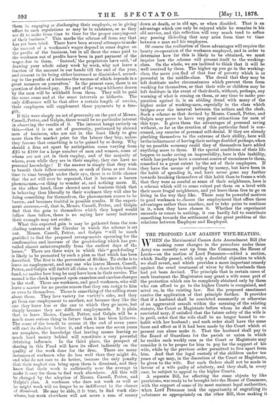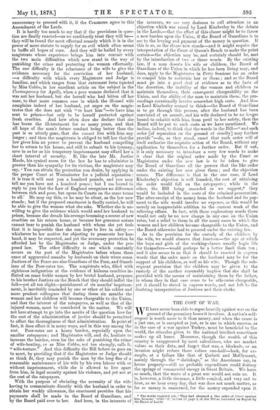THE PROPOSED LAW AGAINST WIFE-BEATING.
IVHEN the Matrimonial Causes Acts Amendment Bill (for making some changes in the procedure under those Acts) was recently sent up from the Commons, the House of Lords—on the motion of Lord Penzance—added a section, which finally passed, with only a doubtful objection to which we shall revert, and which provides a more important remedy against the cruel treatment of wives by their husbands than had yet been devised. The principle that in certain cases of such treatment the Magistrates may grant a wife some part of the protection which can be completely obtained only by those who can afford to go to the higher Courts is recognised, and acted on, in the existing law. But the proposed enactment carries the application of that principle further. It provides that if a husband shall be convicted summarily or otherwise of an aggravated assault within the meaning of the existing statute, the Court or Magistrate before whom he shall be so convicted may, if satisfied that the future safety of the wife is in peril, order that the wife shall be no longer bound to co- habit with her husband ; and such order shall have the same force and effect as if it had been made by the Court which at present can alone make it. That the husband shall pay to the Board of Guardians for the parish or union in which he resides such weekly sum as the Court or Magistrate may consider it to be proper for him to pay for the support of his wife, while by the previous order permitted to live apart from him. And that the legal custody of the children under ten years of age may, in the discretion of the Court or Magistrate, be given to the wife. But such Orders shall not be made in favour of a wife guilty of adultery, and they shall, in every case, be subject to appeal to the higher Courts.
A separate Bill, for effecting the same objects by like provisions, was ready to be brought into the House of Commons, with the support of some of its most eminent legal authorities, when Lord Penzance took the opportunity of engrafting its substance so appropriately on the other Bill, thus making it
unnecessary to proceed with it, if the Commons agree to this Amendment of the Lords.
It is hardly too much to say that if the provisions in ques- tion are finally enacted—as we confidently trust they will be— they will be found the most effectual remedy which it is in the power of mere statute to supply for an evil which often seems to baffie all hopes of cure. And they will be hailed by every magistrate whose experience brings him into contact with the two main difficulties which now stand in the way of punishing the crime and protecting the woman effectually. The one difficulty is the reluctance of the wife to give the evidence necessary for the conviction of her husband, —a difficulty with which every Magistrate and Judge is familiar, and which ranges from that extremest form (quoted by Miss Cobbe, in her excellent article on the subject in the Contemporapy for April), when a poor woman declared that it was not her husband, but she herself who had bitten off her nose, to that more common case in which the ill-used wife complains indeed of her husband, yet urges on the magis- trates that she does not wish "to hurt him "—to have him sent to prison—but only to be herself protected against fresh cruelties. And how often does she declare that she has borne the ill-treatment for so many years, and that all hope of the man's future conduct being better than the past is so utterly gone, that she cannot live with him any longer ; and then the magistrate is obliged to tell her that the law gives him no power to prevent the husband compelling her to return to his house, and still to submit to his tyranny, save in as far as his temporary imprisonment may afford her a short interval of security. If, like the late Mr. Justice Maule, his cynical scorn for the law he has to administer is greater than his sympathy for its victims, the magistrate may say, 'You can obtain the protection you desire, by applying in the proper Court at Westminster for a judicial separation : it is true it will cost you a hundred pounds, and you may tell me you have not a hundred pence ; but I am bound to reply to you that the Law of England recognises no difference between rich and poor, but opens its Courts on the same terms to all.' He may say this, or he may be silent, as the law now stands ; but if the proposed enactment is finally carried, he will be able to give the woman what she asks. Whether she is un- willing to give the evidence which would send her husband to prison, because she dreads his revenge becoming a source of new cruelties on his return home, or because her generous nature cannot bear to punish the husband with whom she yet feels that it is impossible that she can hope to live in safety :— whichever be her motive for objecting to prosecute her hus- band, it may be respected, and yet the necessary protection be afforded her by the Magistrates or Judge, under the pro- posed law. The other difficulty is one which constantly occurs on the part of the Magistrates before whom these cases of aggravated assaults by husbands on their wives come. Justices of the Peace are also Guardians of the Poor, and Guard- ians of the Poor-rates too. The magistrate who, filled with righteous indignation at the evidence of hideous cruelties in- flicted on some feeble woman by her brutal husband, proposes to his brother Justices on the Bench that they should inflict the full—yet all too slight—punishment of six months' imprison- ment, is inevitably reminded by one or other of his colder and more prudent colleagues that during those six months the woman and her children will become chargeable to the Union, and that the interest of the ratepayers, as well as that of the injured woman, must be considered in the matter. We will not here attempt to go into the merits of the question how far the cost of the administration of justice should be permitted to affect the thoroughness of that administration. In point of fact, it does affect it in many ways, and in this way among the rest. Poor-rates are a heavy burden, especially upon the smaller ratepayers ; and Magistrates will, and do, hesitate to increase the burden, even for the sake of punishing the crime of wife-beating, or as Miss Cobbe, not too strongly, calls it, "wife-torture." And this difficulty the Bill before us goes on to meet, by providing that if the Magistrates or Judge should so think fit, they may punish the man by the long fine of a reasonable maintenance of his wife by his own labour with or
without imprisonment, while she is allowed to live apart from him, in legal security against his violence, and yet not at- the cost of the ratepayers.
With the purpose of obviating the necessity of the wife having to communicate directly with the husband in order to obtain her weekly allowance, the enactment provides that his payments shall be made to the Board of Guardians, and by the Board paid over to her. And here, in the interests of 'the measure, we are very desirous to call attention to an objection which was raised by Lord Kimberley in the debate in the Lords,—that the effect of this clause might be to throw a new burden upon the Union, if the Board of Guardians is to see to the levying and payment of the money in question. If this is so, as the clause now stands—and it might require the interpretation of the Court of Queen's Bench to make the point certain—the objection may be, and certainly should be, met by the introduction of two or three words. By the existing law, if a man deserts his wife or children, the Board of Guardians of the Union in which he has been living may, and does, apply to the Magistrates in Petty Sessions for an order to compel him to maintain her or them ; and as the Board must go into a good deal of evidence as to the facts of the desertion, the inability of the woman and children to maintain themselves, their consequent chargeability on the Union, and the ability of the man to maintain them, the pro- ceedings occasionally involve somewhat high costs. And if— as Lord Kimberley seemed to think—the Board of Guardians is to go through this process, after the husband has been convicted of an assault, and his wife declared to be no longer bound to cohabit with him, from peril to her safety, then the Board will be put to such costs as we have mentioned. We incline, indeed, to think that the words in the Bill—" and such order [of separation on the ground of cruelty] may further provide "—do, as they stand, enact that such order will of itself authorise the requisite action of the Board, without any application by themselves for a further order. But if not, it is only necessary to introduce a very few words to make it clear that the original order made by the Court or Magistrates under the new law is to be taken to give the Board of Guardians all the powers that the like order under the existing .law now gives them ; and the objection ceases. The difference is that in the one case, if Lord Kimberley's objection is well founded, the cost of obtaining the order would fall on the ratepayers ; while in the other, the Bill being amended as we suggest,* they would be included in the costs of the criminal prosecution. The after-receipt of the money from the husband and its pay- ment to the wife would involve no expense, as this would be merely an inappreciable addition to the current work of the relieving officer. In fact, with those explanatory words there would not only be no new charge in any case on the Union rates, but a relief to them in all the many cases in which the woman and her children became chargeable to the Union, and the Board otherwise had to proceed under the existing law.
As to the provision for the custody of the children by the wife, we would observe that fourteen—the age at which the boys and girls of the working-classes usually begin life for themselves—would perhaps be a better limit than ten ; and it also seems to us that it should be enacted in express words that the order made on the husband may be for the support of his children, as well as his wife. Though the sub- sequent provision that the children may be given to the custody of the mother reasonably implies that she shall be provided with the means of maintaining them by the father, to whom they in that case cease to be otherwise chargeable, yet it should be stated in express words, and not left to the doubting interpretation of Justices and their clerks.







































 Previous page
Previous page